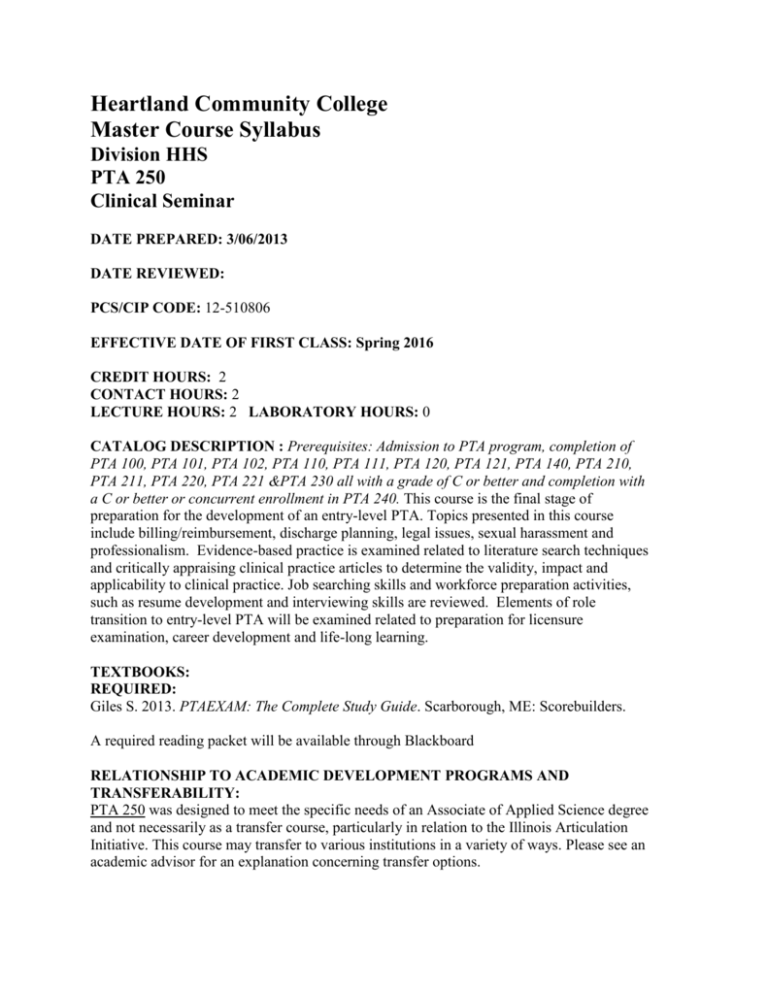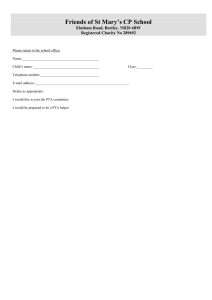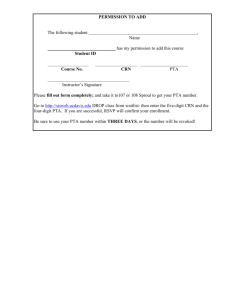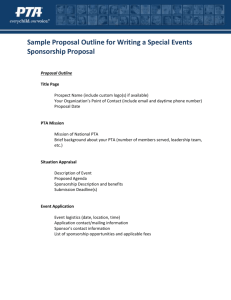
Heartland Community College
Master Course Syllabus
Division HHS
PTA 250
Clinical Seminar
DATE PREPARED: 3/06/2013
DATE REVIEWED:
PCS/CIP CODE: 12-510806
EFFECTIVE DATE OF FIRST CLASS: Spring 2016
CREDIT HOURS: 2
CONTACT HOURS: 2
LECTURE HOURS: 2 LABORATORY HOURS: 0
CATALOG DESCRIPTION : Prerequisites: Admission to PTA program, completion of
PTA 100, PTA 101, PTA 102, PTA 110, PTA 111, PTA 120, PTA 121, PTA 140, PTA 210,
PTA 211, PTA 220, PTA 221 &PTA 230 all with a grade of C or better and completion with
a C or better or concurrent enrollment in PTA 240. This course is the final stage of
preparation for the development of an entry-level PTA. Topics presented in this course
include billing/reimbursement, discharge planning, legal issues, sexual harassment and
professionalism. Evidence-based practice is examined related to literature search techniques
and critically appraising clinical practice articles to determine the validity, impact and
applicability to clinical practice. Job searching skills and workforce preparation activities,
such as resume development and interviewing skills are reviewed. Elements of role
transition to entry-level PTA will be examined related to preparation for licensure
examination, career development and life-long learning.
TEXTBOOKS:
REQUIRED:
Giles S. 2013. PTAEXAM: The Complete Study Guide. Scarborough, ME: Scorebuilders.
A required reading packet will be available through Blackboard
RELATIONSHIP TO ACADEMIC DEVELOPMENT PROGRAMS AND
TRANSFERABILITY:
PTA 250 was designed to meet the specific needs of an Associate of Applied Science degree
and not necessarily as a transfer course, particularly in relation to the Illinois Articulation
Initiative. This course may transfer to various institutions in a variety of ways. Please see an
academic advisor for an explanation concerning transfer options.
LEARNING OUTCOMES: After successfully completing the course, students should be
able to:
Course Outcomes
Program
Range of
Outcomes
Assessment
(POs)
Methods
1. Perform self-assessment
Throughout the
and develop objectives for
semester, the
8
clinical experiences to
following
enhance knowledge/skill.
assessment methods
may be used to
2. Discuss billing and
measure the course
reimbursement issues in
7
and POs outcomes:
various practice settings.
3. Determine patient needs at
7
Survey
discharge.
Writing Assignments
4. Identify concepts related to
Quizzes
legal issues and sexual
7
Homework
harassment.
Presentations
5. Discuss professionalism
Projects
related to the APTA’s
6
CATS
Values-Based Behaviors
for the PTA document.
6. Develop literature search
and appraisal skills to
determine article validity,
8
impact and applicability to
a clinical question.
7. Recognize need for lifelong learning/career
8
development.
8. Identify opportunities
available for career growth
and development, to
6, 8
include the role of the PTA
in clinical education.
9. Develop job searching
skills and complete
workforce preparation, i.e.
8
resume and interviewing
skills.
10. Develop study and test
taking strategies for PTA
8
licensure examination.
11. Display professional
behaviors complimentary
6
to the profession and
within the guidelines of the
APTA’s Standard of
Ethical Conduct.
COURSE/LAB OUTLINE:
Self-assessment of clinical skills
Billing and reimbursement
Discharge planning
Legal issues/Sexual Harassment
Professionalism
Evidence-based Practice
Lifelong Learning/Career Development
Licensure preparation
Clinical experience discussions
METHOD OF EVALUATION (Tests/Exams, Grading System):
Instructors may determine the most appropriate methods of evaluation for their course.
These methods of evaluation might include but are not limited to exams, homework, term
papers and oral reports.
To facilitate attainment of professional behavior students will also be graded on a conduct
rubric. This rubric will be completed by the instructor at the end of the semester and has the
potential to add or deduct one point from his/her course average.
GRADING SCALE:
93-100%
84-92%
75-83%
67-74%
Below 67%
A
B
C
D
F
REQUIRED WRITING AND READING:
On average students will be expected to read 30 pages a week* and complete three 1-3
writing assignments throughout the course.
*estimate is based on a 16 week course schedule. Please note if your class is not a 16 week
class your weekly reading assignment will be increased.







